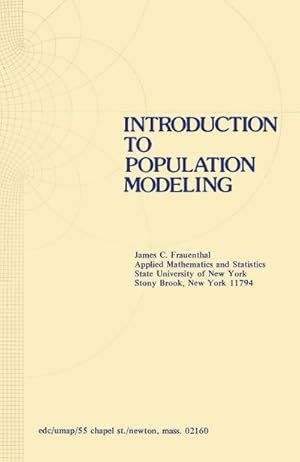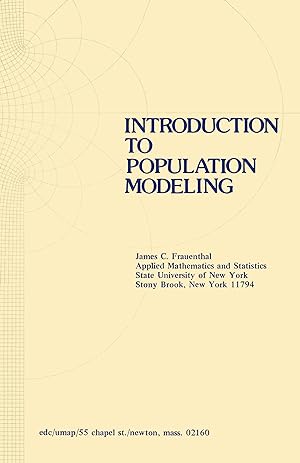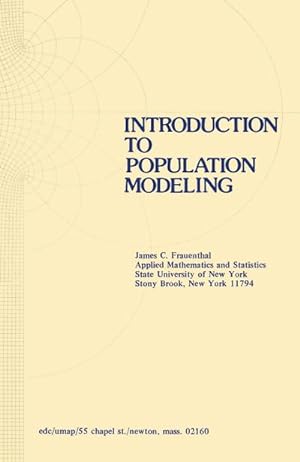Introduction Population Modeling by Frauenthal J C (13 results)
Search filters
Product Type
- All Product Types
- Books (13)
- Magazines & Periodicals (No further results match this refinement)
- Comics (No further results match this refinement)
- Sheet Music (No further results match this refinement)
- Art, Prints & Posters (No further results match this refinement)
- Photographs (No further results match this refinement)
- Maps (No further results match this refinement)
- Manuscripts & Paper Collectibles (No further results match this refinement)
Condition Learn more
- New (12)
- As New, Fine or Near Fine (No further results match this refinement)
- Very Good or Good (1)
- Fair or Poor (No further results match this refinement)
- As Described (No further results match this refinement)
Binding
- All Bindings
- Hardcover (No further results match this refinement)
- Softcover (13)
Collectible Attributes
- First Edition (No further results match this refinement)
- Signed (No further results match this refinement)
- Dust Jacket (No further results match this refinement)
- Seller-Supplied Images (5)
- Not Print on Demand (9)
Language (1)
Price
- Any Price
- Under US$ 25 (No further results match this refinement)
- US$ 25 to US$ 50 (No further results match this refinement)
- Over US$ 50
Free Shipping
- Free Shipping to U.S.A. (No further results match this refinement)
Seller Location
Seller Rating
-
Introduction to Population Modeling (Modules and Monographs in Undergraduate Mathematics and Its Applications)
Seller: Best Price, Torrance, CA, U.S.A.
Condition: New. SUPER FAST SHIPPING.
-
Introduction to Population Modeling (Modules and Monographs in Undergraduate Mathematics and Its Applications)
Seller: Ria Christie Collections, Uxbridge, United Kingdom
US$ 66.65
US$ 15.78 shipping from United Kingdom to U.S.A.Quantity: Over 20 available
Add to basketCondition: New. In.
-
PF. Condition: New.
-
Introduction to Population Modeling
Seller: Kennys Bookshop and Art Galleries Ltd., Galway, GY, Ireland
Condition: New. 1979. Paperback. . . . . .
-
Introduction to Population Modeling (Modules and Monographs in Undergraduate Mathematics and Its Applications)
Seller: Revaluation Books, Exeter, United Kingdom
Paperback. Condition: Brand New. 1st edition. 186 pages. 8.50x5.51x0.47 inches. In Stock.
-
Condition: New. 1979. Paperback. . . . . . Books ship from the US and Ireland.
-
Taschenbuch. Condition: Neu. Druck auf Anfrage Neuware - Printed after ordering - The text of this monograph represents the author's lecture notes from a course taught in the Department of Applied Mathematics and Statistics at the State University of New York at Stony Brook in the Spring of 1977. On account of its origin as lecture notes, some sections of the text are telegraphic in style while other portions are overly detailed. This stylistic foible has not been modified as it does not appear to detract seriously from the readability and it does help to indicate which topics were stressed. The audience for the course at Stony Brook was composed almost entirely of fourth year undergraduates majoring in the mathematical sciences. All of these students had studied at least four semesters of calculus and one of probability; few had any prior experience with either differential equations or ecology. It seems prudent to point out that the author's background is in engineering and applied mathematics and not in the biological sciences. It is hoped that this is not painfully obvious. -vii- The focus of the monograph is on the formulation and solution of mathematical models; it makes no pretense of being a text in ecology. The idea of a population is employed mainly as a pedagogic tool, providing unity and intuitive appeal to the varied mathematical ideas introduced. If the biological setting is stripped away, what remains can be interpreted as topics on the qualitative behavior of differential and difference equations.
-
Taschenbuch. Condition: Neu. Introduction to Population Modeling | J. C. Frauenthal | Taschenbuch | xvi | Englisch | 1979 | Birkhäuser | EAN 9780817630157 | Verantwortliche Person für die EU: Springer Basel AG in Springer Science + Business Media, Heidelberger Platz 3, 14197 Berlin, juergen[dot]hartmann[at]springer[dot]com | Anbieter: preigu.
-
Introduction to Population Modeling (Modules and Monographs in Undergraduate Mathematics and Its Applications)
Seller: Mispah books, Redhill, SURRE, United Kingdom
Paperback. Condition: Very Good. Very Good. book.
-
Introduction to Population Modeling
Published by Birkhauser Boston Inc, 1979
ISBN 10: 0817630155 ISBN 13: 9780817630157
Language: English
Seller: THE SAINT BOOKSTORE, Southport, United Kingdom
US$ 77.19
US$ 17.98 shipping from United Kingdom to U.S.A.Quantity: Over 20 available
Add to basketPaperback / softback. Condition: New. This item is printed on demand. New copy - Usually dispatched within 5-9 working days 290.
-
Introduction to Population Modeling
Seller: moluna, Greven, Germany
Condition: New. Dieser Artikel ist ein Print on Demand Artikel und wird nach Ihrer Bestellung fuer Sie gedruckt. The text of this monograph represents the author s lecture notes from a course taught in the Department of Applied Mathematics and Statistics at the State University of New York at Stony Brook in the Spring of 1977. On account of its origin as lecture notes.
-
Introduction to Population Modeling
Published by Birkhäuser Boston Jan 1979, 1979
ISBN 10: 0817630155 ISBN 13: 9780817630157
Language: English
Seller: BuchWeltWeit Ludwig Meier e.K., Bergisch Gladbach, Germany
Taschenbuch. Condition: Neu. This item is printed on demand - it takes 3-4 days longer - Neuware -The text of this monograph represents the author's lecture notes from a course taught in the Department of Applied Mathematics and Statistics at the State University of New York at Stony Brook in the Spring of 1977. On account of its origin as lecture notes, some sections of the text are telegraphic in style while other portions are overly detailed. This stylistic foible has not been modified as it does not appear to detract seriously from the readability and it does help to indicate which topics were stressed. The audience for the course at Stony Brook was composed almost entirely of fourth year undergraduates majoring in the mathematical sciences. All of these students had studied at least four semesters of calculus and one of probability; few had any prior experience with either differential equations or ecology. It seems prudent to point out that the author's background is in engineering and applied mathematics and not in the biological sciences. It is hoped that this is not painfully obvious. -vii- The focus of the monograph is on the formulation and solution of mathematical models; it makes no pretense of being a text in ecology. The idea of a population is employed mainly as a pedagogic tool, providing unity and intuitive appeal to the varied mathematical ideas introduced. If the biological setting is stripped away, what remains can be interpreted as topics on the qualitative behavior of differential and difference equations. 208 pp. Englisch.
-
Introduction to Population Modeling
Published by Birkhäuser Boston, Birkhäuser Boston Jan 1979, 1979
ISBN 10: 0817630155 ISBN 13: 9780817630157
Language: English
Seller: buchversandmimpf2000, Emtmannsberg, BAYE, Germany
Taschenbuch. Condition: Neu. This item is printed on demand - Print on Demand Titel. Neuware -The text of this monograph represents the author's lecture notes from a course taught in the Department of Applied Mathematics and Statistics at the State University of New York at Stony Brook in the Spring of 1977. On account of its origin as lecture notes, some sections of the text are telegraphic in style while other portions are overly detailed. This stylistic foible has not been modified as it does not appear to detract seriously from the readability and it does help to indicate which topics were stressed. The audience for the course at Stony Brook was composed almost entirely of fourth year undergraduates majoring in the mathematical sciences. All of these students had studied at least four semesters of calculus and one of probability; few had any prior experience with either differential equations or ecology. It seems prudent to point out that the author's background is in engineering and applied mathematics and not in the biological sciences. It is hoped that this is not painfully obvious. -vii- The focus of the monograph is on the formulation and solution of mathematical models; it makes no pretense of being a text in ecology. The idea of a population is employed mainly as a pedagogic tool, providing unity and intuitive appeal to the varied mathematical ideas introduced. If the biological setting is stripped away, what remains can be interpreted as topics on the qualitative behavior of differential and difference equations.Springer Basel AG in Springer Science + Business Media, Heidelberger Platz 3, 14197 Berlin 208 pp. Englisch.







